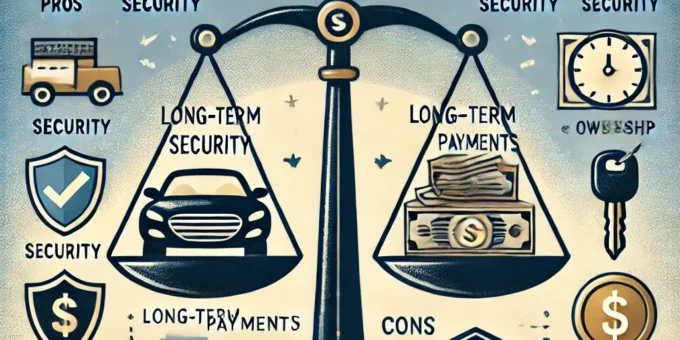
Purchasing a car is a significant financial decision, and for many people, financing makes vehicle ownership possible. However, while car financing offers convenience and flexibility, it also comes with its own set of drawbacks. Understanding the pros and cons of car financing is essential for making an informed decision that aligns with your budget, lifestyle, and long-term goals.
In this comprehensive guide, we’ll explore the advantages and disadvantages of car financing, compare it with other payment methods, and provide tips for getting the best deal on your car loan.
What Is Car Financing?
Car financing allows buyers to purchase a vehicle by borrowing money from a lender, such as a bank, credit union, or dealership. Instead of paying the entire cost of the car upfront, buyers make monthly payments over a set term, which includes interest.
This process makes owning a car more accessible, particularly for people who can’t afford to pay cash outright. However, financing comes with responsibilities, including adhering to the loan terms and ensuring timely payments.
How Car Financing Works
Here’s a quick breakdown of how car financing operates:
- Loan Amount: The lender provides the funds to cover the car’s price, minus any down payment you make.
- Interest Rates: You pay interest on the loan, which varies based on factors like credit score, loan term, and lender policies.
- Loan Term: Loan terms typically range from 36 to 72 months, with longer terms leading to lower monthly payments but higher overall costs.
- Monthly Payments: Your payments include both the principal loan amount and the accrued interest.
Understanding these components helps you make smarter decisions about car financing.
The Pros of Car Financing
- Affordability: Financing spreads the cost of the car over several years, making it easier to manage your budget.
- Access to Better Cars: With financing, you may be able to afford a higher-quality or newer vehicle.
- Builds Credit History: Regular, on-time payments can boost your credit score, which benefits you in future financial transactions.
- Flexibility: Car loans often come with flexible terms and options, allowing you to tailor the loan to your needs.
- Immediate Ownership: Even though the lender technically owns the car until it’s paid off, you get to use the car immediately.
These benefits make financing an appealing choice for many buyers.
The Cons of Car Financing
- Interest Costs: Over the life of the loan, you may pay significantly more than the car’s purchase price due to interest.
- Long-Term Commitment: Car loans can take years to repay, which may strain your budget over time.
- Depreciation Risk: Cars lose value quickly, meaning you could owe more on the loan than the car is worth—a situation known as being “upside down.”
- Hidden Fees: Origination fees, early repayment penalties, and other costs can add up.
- Impact on Budget: Monthly payments reduce your disposable income and could limit your financial flexibility.
Being aware of these drawbacks can help you decide if financing is the right choice.
Car Financing vs. Paying Cash
| Aspect | Car Financing | Paying Cash |
|---|---|---|
| Upfront Cost | Low initial cost (down payment). | High initial cost (full payment). |
| Monthly Payments | Yes, for the loan term. | None. |
| Interest | Pay interest over time. | No interest, saving money in the long run. |
| Vehicle Ownership | Full ownership after loan repayment. | Immediate ownership. |
| Impact on Budget | Monthly payments affect cash flow. | Requires significant savings upfront. |
Car Financing vs. Leasing
| Aspect | Car Financing | Leasing |
|---|---|---|
| Ownership | You own the car after loan repayment. | You don’t own the car; must return it after lease. |
| Monthly Payments | Typically higher than leasing but builds equity. | Lower payments but no equity is built. |
| Mileage Restrictions | Unlimited miles. | Mileage limits with penalties for exceeding them. |
| Customization | Free to modify the car. | Modifications are not allowed. |
| End of Term | Keep the car or sell it. | Return the car or buy it at its residual value. |
Tips for Getting the Best Car Loan
- Check Your Credit Score: A higher score means better rates.
- Shop Around for Lenders: Compare offers from banks, credit unions, and dealerships.
- Negotiate Terms: Don’t accept the first offer—negotiate for better interest rates or terms.
- Save for a Down Payment: The more you put down, the less you’ll need to borrow.
- Consider Loan Term Length: Shorter terms save money on interest, but longer terms have lower monthly payments.
FAQs About Car Financing
Can I pay off my car loan early?
What credit score do I need for car financing?
Should I get pre-approved for a loan before visiting a dealership?
How much should I put down as a down payment?
What happens if I miss a payment on my car loan?
Car financing can be a smart way to afford the car you need, but it’s important to weigh the pros and cons carefully. While financing offers flexibility, credit-building opportunities, and access to better vehicles, it also comes with interest costs, depreciation risks, and long-term commitments.
By understanding your budget, comparing loan offers, and planning for the future, you can make an informed decision that supports your financial health and lifestyle. Whether you choose to finance, pay cash, or explore leasing, take the time to evaluate your options and drive away with confidence.